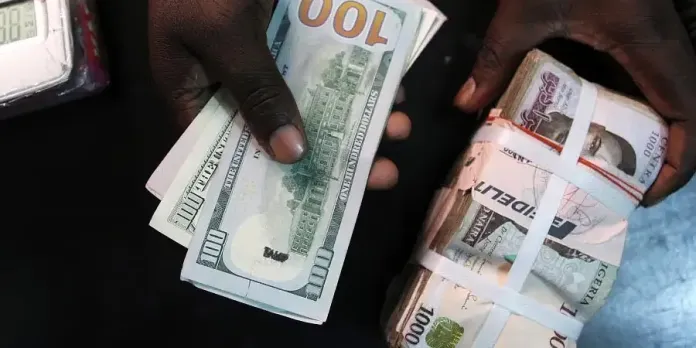Dollar To Naira Exchange Rate Today 14 January 2022 can be accessed below.
This is the news about Dollar to Naira rate at the official and black market exchange rate Today January 14, 2022.
Read GoldenNewsNg update on the official dollar rates as well as Black Market rates, Bureau De Change (BDC) rates, and CBN rates.
How Much Is Dollar To Naira Exchange Rate Today 14 January 2022 Official Rate?
The official rate today, Friday January 14th 2022, for $1 dollar to naira = ₦(yet to be disclosed)/$1.
According to the data at the FMDQ Security Exchange where forex is traded officially, exchange rate between the naira and the US dollar opened at ₦(yet to be disclosed)/$1 on Friday 14th, after it closed at ₦414.29 to a $1 on Thursday, 13th January 2022.
How much is exchange rate of Dollar to Naira in Black Market today 14 January 2022?
The exchange rate for a dollar to naira at Lagos Parallel Market (Black Market) players buy a dollar for N567 and sell at N570 on Friday, January 14th 2022, according to sources at Bureau De Change (BDC).
Please note that the Central Bank of Nigeria (CBN) does not recognise the parallel market (black market), as it has directed individuals who want to engage in Forex to approach their respective banks.
Meanwhile, a report by the National Bureau of Statistics has shown how banks foreign inflow rapidly increased within the period of three years
The report presented capital importation recorded within the years from banks to $38.18bn.
GoldenNewsNg understands from the report that the likes of Stanbic IBTC Bank, Standard Chartered Bank Nigeria, and Citibank Nigeria Limited took the lead in the development.
According to the report, the reported figures on capital importation by banks was recorded between January 2019 and September 2021 (33 months).
The statistics also showed that banks imported the most capital in 2019 at $23.99bn, which reduced to $9.68bn in 2020.
However, in the first nine months of 2021, banks recorded only $4.51bn capital importation, indicating their worst run in the 33 months under review.
The NBS said the capital importation data were obtained from the Central Bank of Nigeria and they include imported physical capital, such as equipment, and financial capital importation.




















